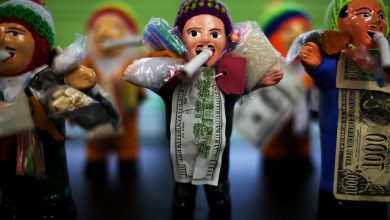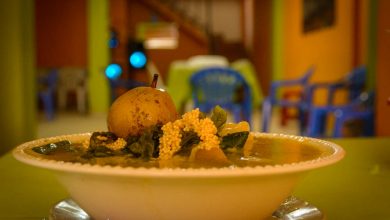Omens, Charms, Augeries, and Dreams Motivate Cuzco

The people of Cuzco hang cobs of corn and thorns in the form of a cross above their doors within their homes to protect them. The also place a stem of rue in a vase behind the door of their businesses. These are but some of many common practices that people pay attention to daily as a sign of a good “augurio”, a word that is strangely hard in English, despite its Latin background.
You could call them charms for good luck, but the word augurio is something that refers to a wish, a prayer, as well as actively creating that which people want. It goes a long way towards making the good fortune come. It is also related to the English word omen which sounds ominous, but which here is not a sign of impending negative fate but hopeful, good fortune.
When the Spanish came to Cuzco they could relate to the constant use of divination and the active modeling and making of good fortune through reading and placing omens. They still kept much of the old Roman custom of augeries, while the English, for one reason or another, as modernity set in, lost them.
In Cuzco those Inca customs around omens continue strongly, with some borrowing from the Spanish. Auguries are a very important part of our lives. They are beliefs that are related to Andean life according to our customs and other things within our culture.
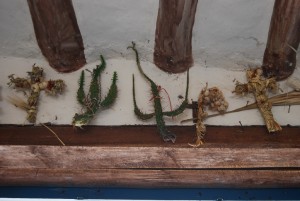
Nevertheless, the details of the things seen or used as omens have changes, even if the practices have been left to us by our ancestors. They stem from stories told to us by the older ones of our culture, but also from things that are latent in our every day life, or things that appear hidden in our dreams.

Dreams are very important to us. The auguries are born there because dreams warn us of problems or of good things. They give us a meaning and we look closely at them to see if they are good auguries or bad auguries because they can establish our destiny. Dreams uncover many things of importance that are demonstrated through logic and evidence
Let me show you. Corn is one of our principle foods. You might dream of corn, maybe sweet corn on the cob. That dream is a very good augury. It means you will have good fortune and you will have money. In rural Cuzco it is a sign of abundance and good harvests in the fields.
People in Cuzco are well acquainted with dreams and their meanings. They know how their dreams take shape and what they mean. Its because their daily lives are like interpretations of their dreams. As a result, they take precautions to either make sure of good things or to try to avoid bad things,
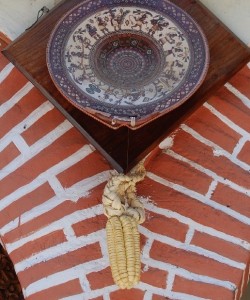
Every morning, at breakfast, families share their dreams with each other. They then discuss them and take the necessary measure for what they future seems to promise them.
Not only do we Cuzqueños worry about auguries, but people in other parts of the Andes do too. When I visited the beautiful city of La Paz, Bolivia I was really surprised. They have the same customs, the same traditions, and the same culture, It is as if our two cities were, as they say, just the same woman (chola) with a different dress. We share the same culture, just separated by today’s national borders. They were also part of the Inca Empire, Tawantinsuyo. It extended from today’s southern Colombia to about the middle of today’s Chile and Argentina.
I met a wonderful family there and they also share their dreams. They too believe strongly in auguries. I probably should not say believe, because they are our culture, our tradition. They are part of our lives in the Andes.
There are many auguries that we practice. They are just latent in our life. For example, among others, parents will often carry the dried umbilical cords of their children int heir wallets like amulets. When the child is born and they cut the umbilical cord, they keep it as a sign of, and a bringer of good luck. Wherever they go things will go well for them because they carry part of their children which has to protect them.
If your hand itches or you feel a little stinging, then people will kiss each other. They call it kollkeor money. It is an augury that you will have money.
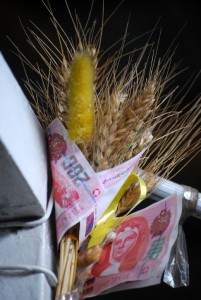
One of the good auguries is to find rue or its seeds. If you see them thrown on the ground, people will quickly pick them up and place them in their pockets or wallets. This is a very good sign in order to obtain good fortune.
More than anything else rue is used in businesses, such as in restaurants, some hotels, or any kind of business. You will probably find a vase or pot of rue there, behind the door or maybe hanging. It is a good omen t bring good business.
To find corn on the ground is also a sign of good fortune, because it attracts good luck. It means you may get money or that maybe you will just have a good day. They say that corn is a magnet that draws good things. The women who sell in the market always use corn and rue together in the cash boxes to attract more money.
Even I have this practice. Whenever I see corn, or maybe dream of sweet corn on the cob, or when I find rue on the ground, I am happy because I know it is a good augury. I am not just saying this. It has been fulfilled many times. Whenever I have run into these things I have also gotten money.
A different example: Taxi drivers are known to hang children’s shoes beneath the steering wheel of their cars. They do this as a good augery so that they might not only have good luck but be protected. They also say the shoes will guide them on a good path.
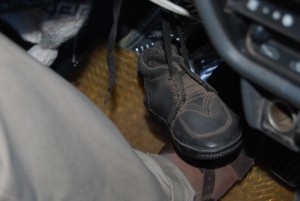
Just as there are good omens there are also bad ones. At night, when everyone is sleeping, suffering souls cry and then for a while the dogs will howl. It seems they perceive it all very quickly because they are more sensitive. That is a bad augury. The dogs know that someone will die the next day or maybe after a couple of days. It is also a bad sign when dogs dig into the earth. That also means someone will die.
The auguries, with their meaning of omens of, wishes for, and techniques to good fortune (or sometimes bad luck) are very strong in every person from Cuzco. I can say this because I I have never met anyone from the Andes who hsn’t talked about dreams or does not believe in auguries.
Even though little by little these auguries may be losing a bit of importance, they are still extremely important in the lives of all Cuzqueñans. Whether bad or good, auguries are part of our culture and our tradition.


